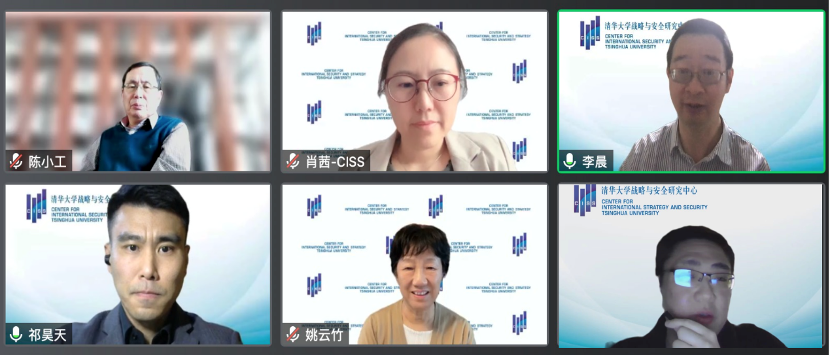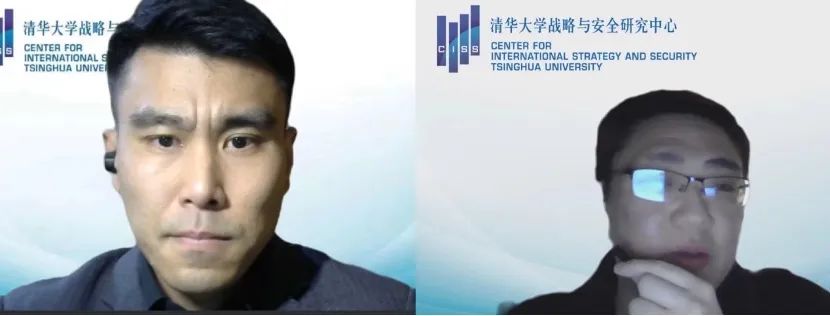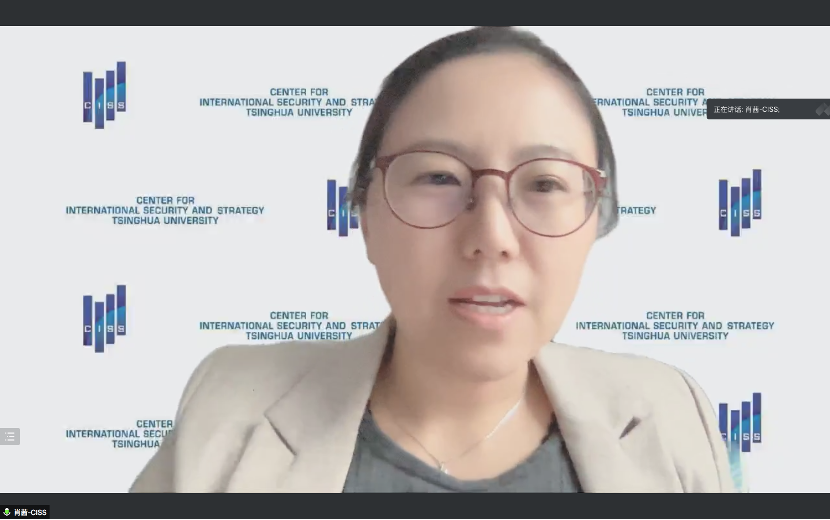

In the afternoon of May 13, the Center for International Security and Strategy (CISS) of Tsinghua University held the 2nd StratFocus Forum, bringing together an online audience of over 200 people. Themed “The Russia-Ukraine Conflict: Implications for War and Strategic Studies,” the event featured Li Chen as the keynote speaker, who is a nonresident senior fellow at CISS and China Forum expert, associate professor in the School of International Studies and director of the international security and strategy program at the Renmin University of China. Qi Haotian, assistant professor in the School of International Studies at Peking University, and Ma Qifei, editor of Reference News, were invited as panelists. The discussants explored the implications of the Russia-Ukraine conflict for theories and perspectives on warfare, the transformation of major powers’ military systems, security cooperation and other related issues. The discussion was followed by comments from Chen Xiaogong, CISS academic member, former deputy director of the Office of the Foreign Affairs Leading Group of the CPC Central Committee and former deputy commander of the Chinese Air Force, and Yao Yunzhu, CISS academic member and director emeritus of the Center on China-American Defense Relations at the Academy of Military Sciences. The event was moderated by Xiao Qian, deputy director of CISS.

It is crucial to note the differences in backgrounds, research focuses and concepts between times of large-scale wars and of peace in studying the current Russia-Ukraine conflict, and to bring research back to common sense using historical experience, Li Chen noted. He analyzed the takeaways of this conflict on war and strategic studies in four areas: limitations of deterrence and war research, testing of conventional warfare theories, military systems, and military aid performance.
Professor Li believes that the failure of the deterrence or coercion strategy has turned the Russia-Ukraine crisis into a conflict, which indicates that specific military or non-military power contrasts cannot directly create deterrence, and that the strategic objectives of the parties involved and the research, determination and war perceptions at the time of decision-making will have a significant impact; in the early stage of a new round of great power competition when the rules and red lines for engagement are not yet clear, studies on deterrence cannot replace those on wars. The current Russia-Ukraine battlefield dynamics is a mirror of the dilemma of conventional warfare doctrine in the post-Cold War era, and attention is required in the theoretical turn, amid the great power competition, in terms of how the effectiveness of technology and systems is offset, the way of war preparation and mobilization, and the objectives and means of information warfare. Li then analyzed the lessons learned on military system building and military aid effectiveness from the recent Ukrainian military reform as well as American and European aid to Ukraine.

After Li’s presentation, Qi Haotian and Ma Qifei shared their observations and reflections on the Russia-Ukraine conflict. Qi pointed out that, in identifying strategic security implications from this conflict, it is important to take into consideration the two faces of security capabilities, the surface as well as endogenous and external factors of strategic security capabilities, and strategic competition and management. Sharing his observations on the conflict from the perspectives of the explicit and implicit costs of conflict, battlefield offense-defense, distribution-concentration, military operational priorities, employment strategies of nuclear and conventional forces and battlefield contingency management, he argued that “if you can’t win the battle, everything goes down the drain.” He also explored the lessons learned from the conflict from the perspectives of translating technological and information advantages, dialectical significance of historical reference, redundancy management and systemic resilience, and believes that in the follow-up research, it is necessary to “face up to the changes and remain cautious about subversion rhetoric.” In the end of his presentation, Qi talked about how the conflict has inspired deterrence and stability adjustments in managing great power competition.
Sharing his insights on the application of historical experience amid great power competition and mid- to high-intensity military conflicts, Ma Qifei believes that it is important to assess military performance at the meso- and micro-levels, draw on studies on low-intensity and similar conflicts in the post-Cold War era, and pay due attention to small state cases. He suggested a comprehensive assessment of this round of conflict in conjunction with the performance of Russian forces in the conflict in eastern Ukraine since 2014. Based on the preliminary judgment of the current conflict process, he presented his analysis on the historical malaise of Russia’s military strategy and the current mismatch between the process and goals of its military reform. Ma concluded his presentation with a summary of the implications of the conflict for adjusting the approaches to war and strategic studies.
The keynote speaker and the panelists then answered the questions raised by the online audience respectively.

Wrapping up the event with their comments, Chen Xiaogong reviewed the four characteristics of the Russia-Ukraine battlefield, and Yao Yunzhu spoke highly of the significance of the active engagement of young scholars in war and strategic studies, noting that academic discussions across civil society will expand the scope and depth of military research and promote academic innovation and research systematization, and that critical observation and dynamic analysis of the war are conducive to more in-depth research. Further discussions are required on issues such as the use of nuclear deterrence strategies, the evolution of US and Russian military doctrine, and the means and objectives of information warfare in this round of conflict, Yao said, adding that the research of the keynote speaker and panelists on military technological transformation, external intervention, and resistance operations by small and medium-sized powers is also of great significance.

About CISS StratFocus Forum:
The CISS StratFocus Forum is launched by the Center for International Security and Strategy of Tsinghua University, with the objective of fostering more talents and building an academic community on security and strategy. The forum, which will be held monthly, aims to serve as an academic exchange platform for students and young scholars in the fields of strategy, security, international relations and diplomacy, where they will be invited to discuss international hotspot issues and cutting-edge research in their disciplines.
